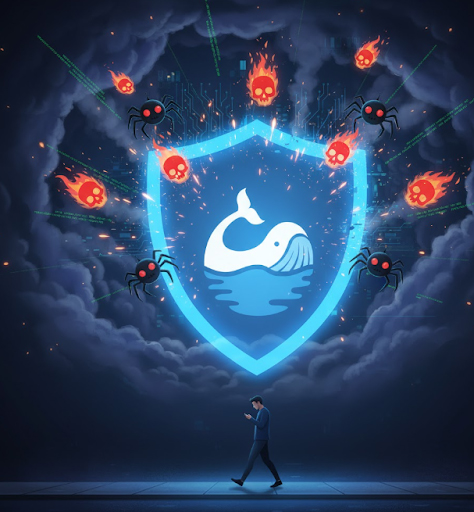Today’s world has transformed into a digital globe spinning at our fingertips. We now shop for groceries from the comfort of our homes, order a product from the other side of the world with a single click, and manage all our financial transactions without ever visiting a bank. While this digitalization brings incredible speed and convenience to our lives, we pay for this comfort by sharing one of our most valuable assets: our personal data.
Our email addresses, credit card details, home addresses, phone numbers, and even our most private memories shared on social media, all of it leaves a massive digital footprint on the servers of the companies we use. Unfortunately, this situation also whets the appetite of malicious actors. The number of those who illegally access our information to use it for fraud, blackmail, or more complex cybercrimes is growing every day.
It is at this point that cybersecurity ceases to be a mere technology term and becomes one of the most fundamental necessities of modern life. The primary duty of the companies that provide us with services is to protect the data we entrust to them. However, this battle is not limited to personal data alone. A virus that infiltrates a company’s digital infrastructure can bring services to a halt, causing millions of dollars in damages. This is why cybersecurity is the cornerstone of the digital age, and its importance can never be ignored.
The Age of Cyber Wars: The Threat is Not Just Individual, but National
To understand the gravity of cybersecurity, one must look beyond individual and corporate risks. Countries like Turkey and Estonia, which have largely digitized their public services, have achieved great success by offering citizens fast and efficient services without the need to wait in line. However, this situation also brings a colossal risk: the consolidation of citizens’ most sensitive data, such as national ID and passport information, under a single digital roof.
We saw how real this risk is during the 2007 events in Estonia, which are regarded as the world’s first cyber war. A political crisis that began with the relocation of a Soviet monument quickly escalated into a digital war. Estonia’s entire digital infrastructure, including government sites, banks, and media organizations, was subjected to a simultaneous cyberattack. Government websites crashed, banks were unable to process transactions for days, and the country’s economy was paralyzed. This event showed the entire world that wars could now be fought not just with tanks and rifles, but with keyboards and code. Today, nations are establishing specialized cyber armies, and it is predicted that a significant portion of future conflicts will take place in cyberspace. Concepts like “data embassies” have even emerged; like Estonia storing its own critical data in Luxembourg, these are strategies that ensure a country’s digital continuity even if it physically collapses.
In the corporate sphere, the Sony Pictures hack is a painful example of how vulnerable a company can be. Attackers infiltrated the company’s network and exposed a massive amount of data, from unreleased films to employees’ personal information and sensitive email correspondence. This attack cost Sony not only billions of dollars in financial losses but also an irreparable loss of reputation.
One of the most frightening examples is the Stuxnet worm. This cyberweapon, targeting Iran’s nuclear program, managed to infiltrate the most secure and isolated facilities through an employee’s USB drive. Stuxnet caused physical damage by imperceptibly altering the speed of centrifuges used in nuclear enrichment, while sending false data to the control systems indicating that everything was operating normally. This event proved that cyberattacks have now reached a level of power where they can not only steal data but also cause physical damage to critical infrastructure.
The Solution: Intelligent Defense with Artificial Intelligence
So, how can we build a line of defense against such complex, stealthy, and destructive attacks? The answer lies in a technology as intelligent as the attacks themselves: Artificial Intelligence.
Artificial intelligence offers revolutionary contributions to cybersecurity in many areas:
Anomaly Detection: It is nearly impossible to detect slow and stealthy threats like Stuxnet with traditional methods. Artificial intelligence, however, learns the normal operating behavior of a system or network and can instantly detect the slightest anomaly. While it’s impossible for a human to notice these deviations among millions of data points, it’s a task that takes seconds for AI.
Rapid Response and Automation: In the event of a large-scale attack like the one on Estonia, responding to every threat with human power is insufficient. AI-powered systems can instantly recognize attack patterns, automatically isolate threats, block malicious traffic, and accelerate response times exponentially by forwarding only the most critical alerts to security teams.
Predictive Analysis: By analyzing historical attack data and global threat intelligence, artificial intelligence can predict potential future attack vectors. This allows organizations to develop a proactive security strategy instead of a reactive defense, staying one step ahead of the attackers.
Become the Cybersecurity Expert of the Future
As you can see, cybersecurity is an extremely serious, complex, and vitally important issue. In this field, merely defending is no longer enough; there is a need for experts who can think like an attacker, understand next-generation threats, and wield powerful tools like artificial intelligence.
If you too want to develop yourself in this field and contribute to the security of the digital world, you can take the first step toward becoming a new-generation cybersecurity expert with The Blue Whale AI Academy’s AI & Cybersecurity course. Take your place in this infinite ocean of knowledge.
Visit The Blue Whale AI Academy and register now.
Contributed by GuestPosts.biz


